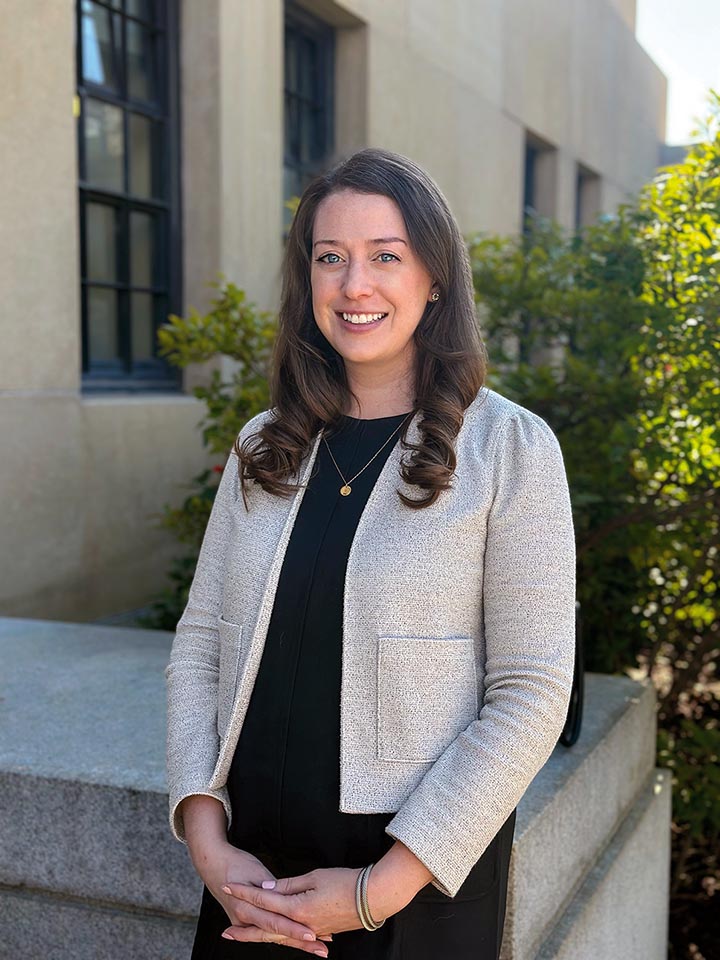Emma Sholl ’11 is an attorney with the Legal Aid Society of Middle Tennessee.

Emma Sholl ’11 works hard to protect the health and educational needs of some of the most vulnerable people in her region. The work she does as an attorney with the nonprofit Legal Aid Society of Middle Tennessee can be vital.
“The help y’all gave me saved my life,” one client told her in a note. “Words can’t say how grateful I am.”
That was after she represented the woman against her state’s Medicaid agency. The health insurance provider refused to cover life-prolonging medication that would fight the client’s chronic illness. Sholl worked with doctors to prove that the medication was medically necessary and should be covered by insurance.
Then there was the case of a low-income family whose baby died suddenly. The family was on the Supplemental Nutrition Assistance Program (SNAP), commonly known as food stamps. As required, the devastated family informed the state about the loss so the state would not continue to give the family extra food stamps for the baby. The state neglected to make the change. Later, the error was discovered, and the state demanded that the family pay back nearly $1,000.
“This was obviously very troubling and upsetting for their family,” Sholl recalls. “I represented them and made sure they did not have to pay back what the state agency had mistakenly given their dead child.”
Sholl is lead attorney of the Health and Benefits Section at the Nashville office of Legal Aid Society of Middle Tennessee and the Cumberlands. The office is one of 131 Legal Service Corporations in the country. Funded through federal grants and private donations, these nonprofit law firms represent poor or disabled clients in civil cases to secure basic rights, such as housing, safety, food, and education.
“People have a right to an attorney when being charged criminally,” Sholl explains. “On a civil side, you don’t have a right to an attorney. We’re the first line of defense. Either we’re representing them, or they don’t have a lawyer.”
She takes about 200 cases a year. Some involve families with special education students, who need extra accommodations or services in school. She’ll look at medical records, meet with doctors or education experts, and determine what could best help the child, whether it’s a tutor, more time to take a test, or access to a specialized class.
Other examples include disabled clients who need additional care, such as nursing or home health aide services, under Medicaid. Some clients try to obtain food stamps but have language or intellectual barriers that prevent them from being able to advocate for themselves. Other clients are domestic violence victims who have fled dangerous situations with their children, and are now homeless and without income.
“We don’t get people out of poverty. The problem is too vast,” Sholl says. “What we do is get them through a crisis.”
Such crises are not uncommon. Tennessee was one of 10 southern states that elected not to expand Medicaid in the past decade, even though it involved federal and not state funds. That has left a segment of the population, such as single and childless people, without an option for low-income health insurance. Tennessee has also seen the closure of many rural hospitals, she says.
“In general, it can be very difficult to obtain medical care in Tennessee if you are poor and sick,” she says.
At Legal Aid Society, cases are accepted based on legal merit and the significance of the situation. Another consideration is the vulnerability of the client.
“If the client is illiterate, has disabilities, does not speak English, etcetera, then that is an extra reason why we might take a case, because it is unlikely that the client can navigate the system on their own,” Sholl says.
DarKenya Waller, executive director of Middle Tennessee, described Sholl as a meticulous and passionate litigator.
“She could work at any big law firm. She’s committed to assisting people who are unable to help themselves,” Waller says. “It is a great sacrifice to do so. But she chooses to be here. In doing so, she makes a tremendous impact.”
Sholl traces the arc of her career all the way back to a single class at Colgate. The English major thought she might follow in her dad’s footsteps and become a lawyer, so she took The Upstate Law Project with Susan Conn ’79. Through that class, she was able to work with lawyers at the Legal Aid Society of Mid-New York, another Legal Services Corporation, on civil court cases. Conn became a mentor to Sholl, who attended Tulane University Law School and then moved to Nashville.
